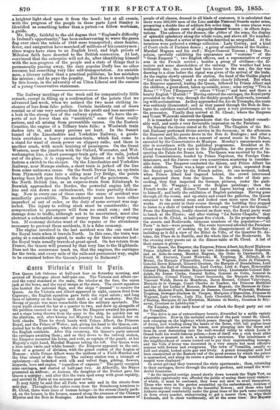The Railway meetings of the week call for comparatively little
remark, except in filling up a confirmation of the points that we advanced last week, when we noticed the two most striking in- stances of loss from false policy. Certain incidents out of doors remind us of one very serious item in the profit and loss account— a leak in the strong box of the railway system. We have the re- ports of not fewer than six "accidents," some of them really serious, and all arising from preventible causes. On the Eastern Counties, the engine of a Tilbury train fails; a Woolwich train dashes into it, and many persons are hurt. In the Sannit tunnel of the Lincolnshire and Yorkshire Railway, a goods- train overtakes a heavy excursion-train, which had come to a stand for want of steam power on slippery rails; and there is another crash, with much bruising of passengers. On the Great Western, near the junction with the Oxford, Worcester, and Wol- verhampton line, a short passenger-train gets off the rails, jerked out of its place, it is supposed, by the failure of a bolt which fastens a switch to the sleeper. On the Lincolnshire and Yorkshire Railway, near Mumps station, a short train is jerked off the line from some unknown cause. On the South Devon line, an up-train from Plymouth runs into a siding near Ivy Bridge, the points having been left open through the neglect of the pointsman. On the North British line, as an express-train from Edinburgh to Berwick approached the Border, the powerful engine left the line and ran down an embankment, the train partially follow- ing. Now in every one of these cases the cause of accident was manifeetly preventible. The machinery must have been either imperfect or out of order, or the duty of some servant was neg- lected. The injury to rolling stock must be considerable; the oompensation to passengers will form no small sum ; and the damage done to traffic, although not to be ascertained, must also abstract a substantial amount of money from the railway strong box. If economy dictates want of the repairs or the attendance necessary to prevent these accidents, it is a false economy.
• The engine involved in the last accident was the one used for the Royal train when it travels North. In this case, the train was going at a considerable speed, to make up for three minutes lost : the Royal train usually travels at great speed. On her return from France, the Queen will proceed by that very line to the Highlands. Does not the occurrence teach no, that the engines, the carriages for the train, and every mile of the rails and permanent way, ought to be examined before the Queen's journey to Balmoral?
























 Previous page
Previous page